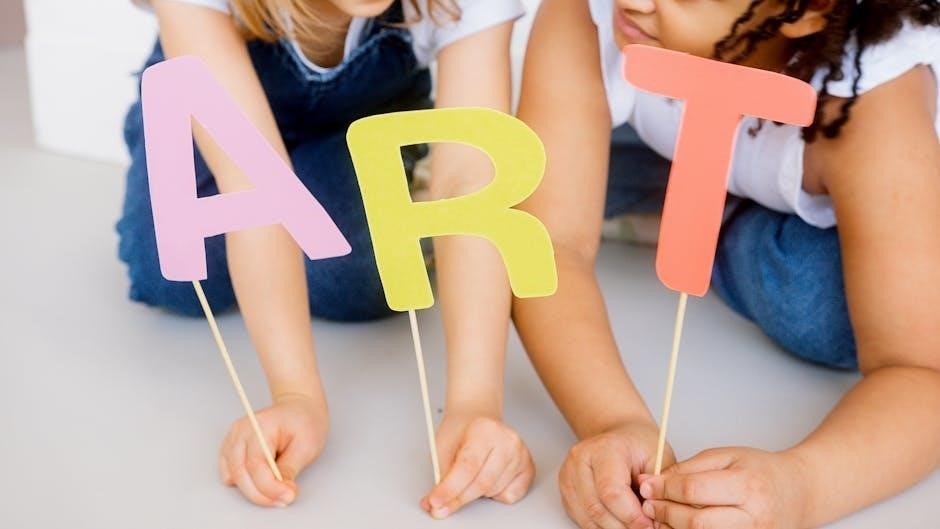Preschool assessment forms are tools used to evaluate a child’s development across social‚ emotional‚ physical‚ and cognitive domains. They help educators and parents identify strengths and areas needing support‚ ensuring personalized growth through structured observations and progress tracking.

Importance of Preschool Assessment
Preschool assessment forms play a crucial role in early childhood education by providing insights into a child’s developmental progress. They help identify strengths‚ areas for improvement‚ and learning gaps‚ enabling educators to tailor instruction and support. These tools foster collaboration between teachers and parents‚ ensuring a unified approach to a child’s education. By documenting milestones‚ assessments support early intervention for children needing additional help. They also facilitate communication‚ creating a shared understanding of a child’s needs. Regular assessments allow for tracking progress over time‚ celebrating growth‚ and addressing challenges promptly. This proactive approach ensures children are well-prepared for future academic and social endeavors‚ making preschool assessments indispensable for fostering holistic development in young learners.
Components of Preschool Assessment Forms
Preschool assessment forms typically include evaluations of social-emotional development‚ cognitive skills‚ physical development‚ and language development. These components help measure a child’s abilities‚ such as sharing‚ problem-solving‚ motor skills‚ and communication‚ providing a holistic view of their progress.
3.1. Social-Emotional Development
Social-emotional development assessments evaluate a child’s ability to interact with peers‚ demonstrate empathy‚ and manage emotions. These forms often include observations of cooperation‚ sharing‚ and conflict resolution skills. Teachers and parents use these tools to track progress in self-awareness‚ self-regulation‚ and relationship-building. By documenting behaviors during play and group activities‚ educators can identify areas where a child may need additional support. For example‚ forms may assess how well a child expresses emotions‚ takes turns‚ or shows kindness to others. This component is crucial for understanding a child’s emotional intelligence and social readiness for further learning. Regular monitoring helps create personalized strategies to foster healthy social-emotional growth‚ ensuring children develop essential life skills from an early age. These assessments are often paired with examples of positive behaviors and areas for improvement‚ providing clear guidance for both educators and parents.
3.2. Cognitive Skills
Cognitive skills assessments in preschool forms focus on evaluating a child’s problem-solving abilities‚ memory‚ and understanding of basic concepts. These tools help educators measure skills such as shape and color recognition‚ number sense‚ and language development. Forms often include activities like matching games‚ sorting objects‚ and counting exercises to gauge a child’s cognitive growth. By observing how children approach tasks‚ teachers can identify patterns in learning and areas where additional support may be needed. For example‚ assessments might evaluate a child’s ability to recall sequences‚ complete puzzles‚ or demonstrate an understanding of cause-and-effect relationships. These evaluations provide insights into a child’s intellectual development and readiness for more complex learning. Regular cognitive assessments ensure that educators can tailor activities to meet individual needs‚ fostering a strong foundation for future academic success. They also help parents understand their child’s progress and how to support their cognitive growth at home.
3.3. Physical Development
Physical development assessments in preschool forms evaluate a child’s motor skills‚ coordination‚ and overall physical abilities. These assessments focus on both fine motor skills‚ such as using utensils‚ drawing‚ and stacking blocks‚ and gross motor skills‚ like running‚ jumping‚ and balancing. Tools like activity checklists and observation sheets are used to track progress. For instance‚ forms may include tasks that require children to color within lines‚ cut shapes‚ or demonstrate hand-eye coordination. These evaluations help identify developmental delays and ensure children are meeting age-appropriate milestones. By monitoring physical growth‚ educators can provide targeted support‚ such as adaptive exercises or sensory activities. Regular physical assessments also enable parents and teachers to collaborate on fostering healthy development. This section of the assessment form plays a crucial role in ensuring children build the physical foundation needed for future academic and personal success.
3.4. Language Development
Language development assessments in preschool forms focus on evaluating a child’s ability to communicate effectively. This includes both expressive language skills‚ such as speaking clearly‚ using vocabulary‚ and forming sentences‚ and receptive language skills‚ like understanding instructions and engaging in conversations. Assessment tools often include checklists‚ observation sheets‚ and activity-based evaluations. For example‚ forms may ask educators to note a child’s ability to identify letters‚ name objects‚ or retell simple stories. These assessments help identify delays in speech or comprehension and provide insights into how children process and use language. By monitoring progress‚ educators can tailor activities to enhance communication skills‚ such as reading aloud or role-playing. This section is vital for ensuring children develop the foundational language abilities needed for future academic success and social interactions.

Types of Preschool Assessment Forms
Preschool assessment forms come in various types‚ each designed to capture specific aspects of a child’s development. Common forms include progress tracking sheets‚ which monitor growth over time‚ and observation checklists‚ used to document behaviors during play. Skill assessment worksheets focus on specific areas like math‚ language‚ or fine motor skills‚ while report cards provide a comprehensive overview of a child’s abilities. Additionally‚ parent-teacher communication forms facilitate collaboration between educators and families. Many of these forms are available as downloadable PDFs‚ making them easy to customize and share. These tools help educators identify strengths‚ areas for improvement‚ and developmental milestones‚ ensuring a well-rounded understanding of each child’s progress. By using diverse assessment types‚ educators can gather comprehensive data to support individualized learning plans.

Benefits of Using Preschool Assessment Forms
Using preschool assessment forms provides numerous benefits for educators‚ parents‚ and children. These tools enable a comprehensive evaluation of a child’s developmental progress‚ helping to identify strengths and areas needing support. They facilitate personalized learning plans‚ ensuring each child receives tailored guidance. Assessment forms also foster collaboration between teachers and parents‚ creating a cohesive support system for the child. Additionally‚ they allow for the early detection of developmental delays‚ enabling timely interventions. The use of PDF formats makes these forms easily accessible‚ customizable‚ and shareable. Regular assessments help track growth over time‚ celebrating milestones and fostering a sense of accomplishment. Overall‚ preschool assessment forms are invaluable for promoting holistic development and preparing children for future academic success.

Challenges in Implementing Preschool Assessments
Implementing preschool assessments can present several challenges. One major issue is the time-consuming nature of administering and analyzing assessment forms‚ which can strain educators’ workload. Additionally‚ ensuring accuracy and consistency in observations and evaluations can be difficult‚ as it requires skilled and trained professionals. Another challenge is the potential for subjectivity in assessments‚ as interpretations of a child’s abilities may vary among observers. Moreover‚ some assessment tools may not account for cultural or developmental diversity‚ leading to biased results. Accessing and utilizing digital tools‚ such as PDF formats‚ may also pose technical challenges for some users. Finally‚ effectively communicating assessment results to parents and using them to inform teaching practices can be a hurdle. Addressing these challenges is crucial to ensuring the effectiveness and fairness of preschool assessments.
Best Practices for Using Assessment Forms
Using preschool assessment forms effectively requires several best practices. First‚ ensure that assessments are conducted by trained educators to maintain accuracy and consistency. Regularly observe children in their natural play and learning environments to gather authentic data. Use standardized tools‚ such as PDF formats‚ to streamline the process and ensure reliability. Involve parents by sharing findings and incorporating their insights to create a holistic view of a child’s development. Focus on using assessments to inform instruction rather than solely for evaluation. Additionally‚ ensure confidentiality by securely storing assessment records. Provide clear and actionable feedback to support individualized learning plans. Finally‚ use assessments periodically to track progress and celebrate growth. By following these practices‚ educators can maximize the benefits of preschool assessment forms while minimizing potential challenges.
Tools and Resources for Assessment
Various tools and resources are available to support preschool assessment‚ including PDF templates designed for tracking developmental progress. These resources often feature structured forms for observing and documenting skills across domains like social-emotional‚ cognitive‚ and physical development. Many tools‚ such as name writing samples and math assessment sheets‚ are customizable to meet individual classroom needs. Additionally‚ digital platforms and software offer editable versions of these forms‚ enabling easy sharing and collaboration between educators and parents. For example‚ tools like Google Docs and PDF filler allow for real-time updates and secure storage of assessment data. Some resources also include pre-designed portfolios and progress tracking sheets‚ making it easier to organize and review a child’s growth over time. These tools not only streamline the assessment process but also ensure that educators can focus on providing tailored support for each child’s unique learning journey.
Case Studies and Success Stories
Case studies and success stories highlight the practical application of preschool assessment forms in improving child development. For instance‚ a preschool program implemented a comprehensive assessment system using PDF templates to track progress across social‚ emotional‚ and cognitive domains. This approach allowed educators to identify areas where children needed additional support‚ leading to targeted interventions. One success story involved a child who showed significant improvement in fine motor skills after structured activities were incorporated based on assessment feedback. Another example featured a home preschool program that used progress tracking forms to document a child’s growth over a year‚ demonstrating measurable advancements in language and problem-solving abilities. These real-life examples underscore how effective use of assessment tools can lead to meaningful outcomes‚ fostering collaboration between educators and parents to support each child’s unique learning journey.
Implementation Strategies
Implementing preschool assessment forms requires a structured approach to ensure effectiveness. Begin by integrating the forms into daily routines‚ such as during play or learning activities‚ to make the process seamless. Provide educators with training on how to accurately observe and document developmental milestones using PDF templates. Engage parents by sharing observation forms and encouraging their participation in tracking progress. Use digital tools to streamline the process‚ ensuring forms are accessible in formats like PDF or Google Docs for easy sharing. Consistency is key; schedule regular assessments to monitor growth over time. Finally‚ ensure clear communication between educators and parents to address findings and plan interventions. By following these strategies‚ preschool programs can effectively use assessment forms to support each child’s unique developmental journey.
Future Trends in Preschool Assessment
Future trends in preschool assessment emphasize the integration of technology and innovative methods to enhance accuracy and accessibility. Digital tools‚ such as AI-driven assessment platforms‚ are expected to streamline the evaluation process‚ offering real-time insights into a child’s developmental milestones. Gamification and interactive activities will likely become more prevalent‚ making assessments engaging for young learners. Additionally‚ there is a growing focus on PDF and cloud-based formats‚ enabling seamless sharing between educators and parents. Personalized assessment reports‚ tailored to individual needs‚ will gain prominence. These trends aim to foster a more inclusive and data-driven approach to early childhood education‚ ensuring every child’s progress is tracked and supported effectively.
Examples of Effective Assessment Forms
Effective preschool assessment forms often include comprehensive tools like the Preschool Progress Tracking PDF‚ which documents developmental milestones across social‚ emotional‚ and cognitive domains. Another example is the Cognitive Skills Assessment Form‚ designed to evaluate problem-solving abilities and memory retention. These forms typically feature structured sections for observations‚ checklists for skill mastery‚ and spaces for qualitative feedback. For instance‚ the Math Assessment Worksheet includes activities for counting and shape recognition‚ while the Language Development Form focuses on vocabulary and communication skills. Many forms also incorporate visual aids‚ such as color recognition charts‚ to engage young learners. Additionally‚ Parent-Teacher Communication Forms ensure collaboration‚ allowing educators to share insights and involve families in a child’s growth. These examples demonstrate how assessment forms can be tailored to specific needs while maintaining a child-centered approach.
Preschool assessment forms are invaluable tools for monitoring and supporting young children’s development. They provide insights into cognitive‚ social‚ emotional‚ and physical growth‚ enabling educators and parents to tailor interventions and enrichment activities. By using structured formats like PDF checklists and progress tracking sheets‚ these forms ensure consistency and clarity in documentation. They also foster collaboration between teachers and families‚ creating a unified approach to a child’s education. The availability of customizable templates and digital tools enhances accessibility and adaptability. Ultimately‚ preschool assessment forms play a crucial role in laying a strong foundation for future academic success. Their systematic use ensures that every child’s unique needs are met‚ promoting holistic development and preparing them for lifelong learning.

